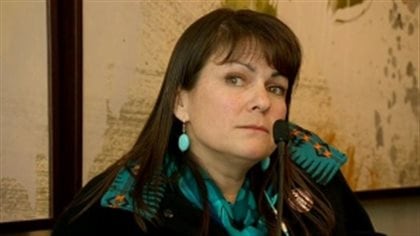The Native Women’s Association of Canada, NWAC, has been demanding an inquiry into missing and murdered indigenous women and girls for over six years now. Dawn Lavell-Harvard is president of the organization that has been speaking on behalf of Canada’s aboriginal women since 1974.
“much more optimistic this year… but cautiously optimistic”
On this International Women’s Day, Lavell-Harvard has been busy attending events in honour of the occasion, but in an interview she spoke about being shocked and offended by the treatment of her group by the new Liberal government. Still, she says the members of her group are “much more optimistic this year… but cautiously optimistic”.
ListenThe federal election last fall heralded a change in government. During the campaign, the committment to hold an inquiry into the missing and murdered indigenous women, had been a promise of the new government. The process is underway to establish how and when it will take place, with an effort to ease the suffering of families who have to face traumatic events again. One of the most recent revelations of the process, is that the number of missing and murdered native women across Canada, may be closer to 4,000, than the frequently quoted 1,200.

The previous Conservative government of Stephen Harper consistently denied the need or value of holding an inquiry, this, as Lavell-Harvey says, “despite the fact that all of the provinces, that all the national aboriginal leadership, that the majority of the country recognized this was a problem, that major international human rights watchdogs recognized this was a problem, the federal government was continuing to block any movement on this direction.”
If there was a honeymoon period for this new government, however, it came to an abrupt end for the NWAC last week when representatives of the group were not welcomed to the gathering of the Premiers with the Prime Minister and First Nations, Inuit, and Metis leaders that took place on March 2, 2016 in Vancouver, British Columbia.
“We were really quite shocked to see that the NWAC was deliberately left out, actively excluded from conversations on climate change. And considering the fact that, even according to Health Canada’s own research, indigenous women are going to be some of the hardest hit, the most impacted by climate change, it’s really concerning that there was this unilateral and seemingly arbitrary decision to exclude the Native Women’s Association of Canada.”
For Dawn Lavell-Harvard, It raises the question of whether this decision is a continuation of the what the NWAC describes as the historic reality with the reverberations of a colonial system that “entrenched sex-based discrimination against first nations women”.
“Our women had a say, our women had a voice”
“Personally I find it very offensive to see that the language of only title-holders would be included in the conversation. I thought that the last vestiges of title-holder as criteria for having a voice in this country, from what I saw, we got rid of the last vestiges of that in 1948, back before the ’50’s, and so now for it to be, that kind of language to be rearing its ugly head again, that only title-holders deserve a voice at the table, is offensive.” Lavell-Harvard says. “We can see how, especially given the way land-title rules have been organized, the way Indian Act rules work, that means that the voices of Indigenous women have been traditionally excluded and are now once again excluded from a very critical conversation.”
“To have some closure for those families and some justice for the women…”
Asked about the upcoming Inquiry into missing and murdered native women and girls, Lavell-Harvard says they have no idea when it will begin but as for what she wants to see come out of it, she is quick with an answer: “We want to make sure that this process maintains the larger human rights focus, as well as a stream or a process to address the lack of justice for many of the families.” She cautions that several cases will be identified where there was misconduct, and that proper investigations were neglected. “There are certain cases that will need to be reopened. We’re really hoping to see a process that will allow that.”
Dawn Lavell-Harvard says it is also important that the families involved in the Inquiry are cared for. “We can’t have families coming forward sharing their stories, their trauma and then walking out of the room as if nothing has happened.” It is anticipated that the Inquiry may begin in the early summer.







For reasons beyond our control, and for an undetermined period of time, our comment section is now closed. However, our social networks remain open to your contributions.